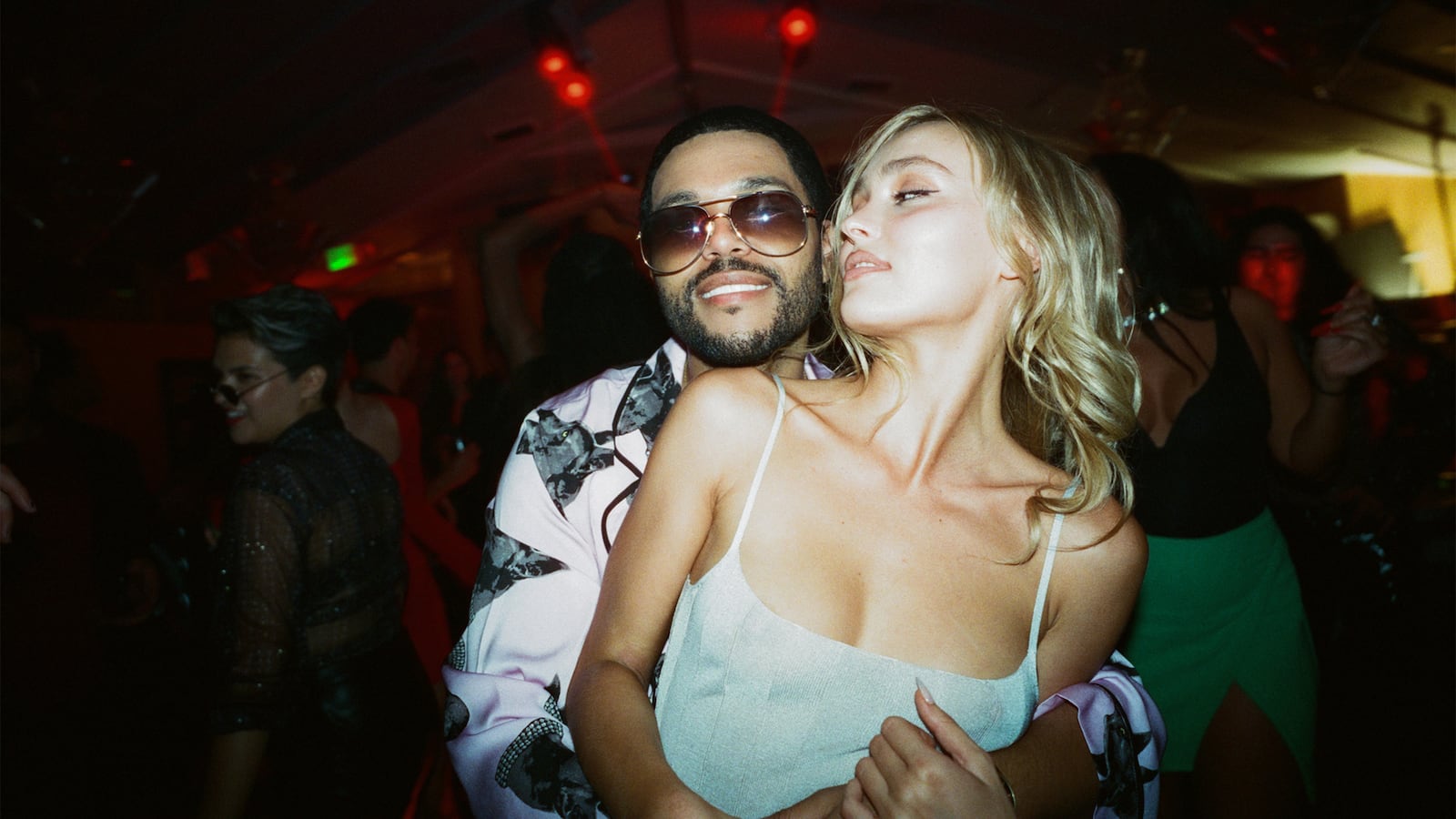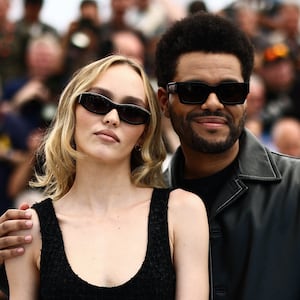The Idol opens with a scene that feels ripped straight from the controversial production of The Idol itself. The intimacy coordinator on pop star Jocelyn’s (Lily-Rose Depp) album cover photo shoot is kicked off set for following the rules of her rider. We’re not even five minutes into the pilot, “Pop Tarts & Rat Tales,” before the show’s notoriously provocative creator, Sam Levinson, has turned the monitor meant to make sure that celebrities are safe and protected when asked to do nudity or perform sex scenes into the villain.
“Give me that laugh again,” the photographer tells Jocelyn, who squeaks, sounding more like a sorority girl in that Bama Rush doc than a superstar. Then she’s told to give “innocence.” Then “pure sex.” Then “vulnerable.” A tear rolls down her cheek after she’s asked to be “emotional,” a shallow portrayal of Jocelyn’s precarious mental health state: Is she so good at acting that she can whip out a single teardrop on command? Or is she actually hurting? So deep.
More on that later—because duh, it’s Euphoria mastermind Levinson who is behind this show, after all. But Jocelyn (who has the boring nickname “Joss,” which reminds me of Joss Whedon and the Voss product placement sprinkled throughout this episode) is too busy flashing the photographer to care about her emotions. She says she wants to show her full areola. The photographer obliges, but the intimacy coordinator says nudity to this extent is not in her original rider. (Various areas of her breasts and cleavage were agreed on, but no nipple area.) The fix, the coordinator says, would be simple: renegotiate, wait 48 hours, then shoot with full nip in the frame without any legal worry.
But what Joss says goes. One of the managers on her team, Chaim (Hank Azaria), locks the intimacy coordinator in the closet. Jocelyn shoots the photos she wants for the album cover, boob and all. Hallelujah. Let the chaos begin.

Jocelyn’s team, who we’re introduced to early on as they orbit their charge’s every move, has more personality than the star herself. They include Rachel Sennott as her assistant, Dan Levy as her publicist, and a flurry of other folks like Troye Sivan, Jane Adams, Da’Vine Joy Randolph, and Eli Roth, who plays an angry worker from events promoter and venue operator Live Nation—all who are, depending on your fondness for scene-stealing supporting players, bigger draws than Nepo Baby Depp herself. Also joining the crew is Blackpink’s Jennie Kim as Jocelyn’s dance stand-in and Hari Nef as Talia, a reporter from Vanity Fair, who is profiling Joss for a magazine piece.
Jocelyn is famous for being like Britney, her team argues, a misunderstood pop-star who has such mainstream appeal because she’s so damaged. Nikki (Adams) and Xander (Sivan) argue about this ethos. Xander, a younger member of the team, says this portrayal is problematic. But Nikki thinks he’s too online, that having issues with—well, whatever Joss struggles with—is a huge, sexy allure to people who live in the middle of the country, who may have never met a person like Jocelyn in real life. “Stop trying to cock block America,” Nikki demands. “Mental illness is sexy.” No comment—that line speaks for itself.
Whether the idea of “sex really sells” in pop music today is up for debate; isn’t Taylor Swift, the singer who writes about crushes and frolicking in the woods, the biggest star touring America right now? The songs themselves, all written by The Weeknd, aren’t convincing hits either.
A line from that aforementioned tune: “So get down on your knees, get ready to become my bitch. I’m just a freak, yeah! You know I want it bad. We can meet, yeah, but I don’t need to know your name. You can pull my hair, touch me anywhere.” Show them how it’s done, girl, with this song from an Abercrombie & Fitch playlist!
Jocelyn isn’t all that inspired by her music either, though, which is evident by her disaffected dancing. Her sour mood does not go unnoticed by Dyanne (Kim), who demands the whole crew go out to a club to celebrate the photo shoot and let loose. At the club, Jocelyn meets the owner, Tedros (The Weeknd, who now goes by Abel Tesfaye). In between greasy make-out seshes, the pair have an unmeaningful conversation about the state of the music industry. Jocelyn thinks her bops are pointless and superficial.
But to Tedros, pop music is “the ultimate Trojan horse.” You can hide any feelings, any emotions, any message in a pop song. That message can, however, be quite bad, even culty—which is the direction their relationship seems to be heading, considering Tedros is “kind of rapey,” per Sennott’s Leia. (“Yeah, I kind of like that about him,” Joss says, not even in defense of him, but rather in appreciation of what her assistant has just said about the man.)

We see Joss masturbating while choking herself after her first encounter with Tedros; then, when he comes to visit, he holds a piece of red nylon fabric over her face while she moans and groans. Is this supposed to be hot? Or appealing, in any way? Perhaps neither, as Tedros stabs a breathing hole for Jocelyn with his pocket knife and whispers to her: “Now, sing.” The Idol is trying to blend sensuality with some kind of toxic creative Stockholm Syndrome, but whatever edgy commentary the show is trying to make isn’t landing.
This is all without mentioning the “human cumsock” crisis that kicks off the show, in which an explicit photo of Joss with fresh semen on her face leaks online. Her team panics. Joss doesn’t care. The Vanity Fair reporter asks her if she wants to use the profile to get revenge on the man who leaked the photo, but as we’ve come to learn, Joss is a masochist—this negative attention is gold to her.
From the start, the story is all over the place, so clearly penned by a man with little understanding of or care for victims, rape culture, or mental health. That said, there are a few reasons to watch at least one more episode of the five left to come: Sennott, for one, made me laugh with every new line, particularly her awkward explanation of what “bukkake” is.
Then there’s the fact that each of Levinson’s projects is more visually stunning than the last. The Idol is no outlier here. Shots of Jocelyn smoking cigarettes on her terrace, her body engulfed in a slinky red robe and a big black frame, along with those of her posse venturing through the glamorous streets of Los Angeles, stood out as bright portraits of hope. Levinson knows how to direct an episode of TV—or perhaps all credit should be given to his trusty cinematographer, Marcell Rév.
Then again, if the goal was just to watch stunning snaps of hot people dancing in enviable outfits, perhaps searching those exact keywords on YouTube would result in similar footage. That way, you wouldn’t have to witness The Idol’s awkward dialogue, The Weeknd’s rat tail, or any of the other sure-to-be “prestige” catastrophes that will likely follow in the next episodes of this bonkers, explosive, problematic series.

The Sam Levinson of it All
Sam Levinson, who has already drummed up quite a bit of controversy thanks to his past works like Euphoria and Malcolm & Marie, is the creative “visionary” behind The Idol. Here are the moments we thought really show the audience the man he is.
-Jocelyn smokes a cigarette everywhere she goes, which feels so out of touch when even Lana Del Rey is looping her vape into her belt loop at live performances. That diva would have her own vape line on shelves at every bodega in New York City.
-Including “Criminal” by Fiona Apple in the tracklist—criminal! Literally. Jocelyn’s “You know I want it bad” compared to “I’ve been a bad, bad girl” is like pairing Sam Smith’s “Unholy” with Björk’s “It’s Oh So Quiet.” Which is to say: It’s tacky.
-“Having her around is like living in communist China,” Nikki says of the Vanity Fair reporter. Tell us you hate journalists without saying “I hate journalists.”
-In her interview with the Vanity Fair reporter, Jocelyn drops some real gems of answers. My favorite: “Who do you answer to?” the reporter asks. Joss takes a loooooong drag of her cigarette before answering. “God,” she says.







